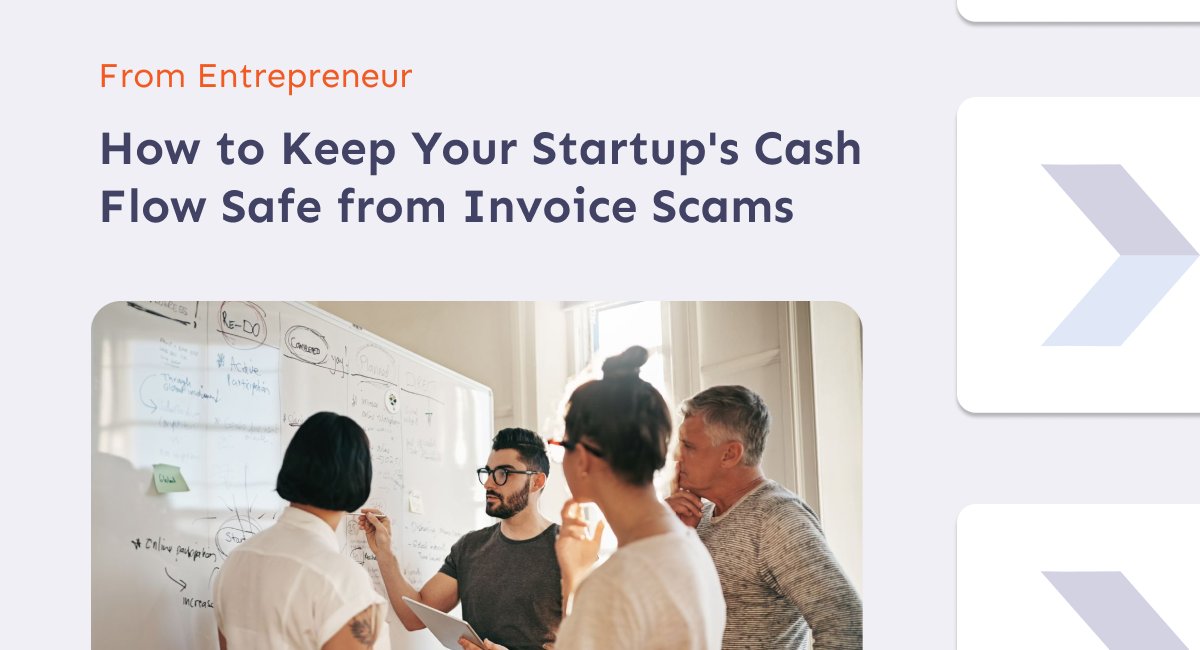Originally published on Entrepreneur.com
Invoice fraud is a pervasive threat that can wreak havoc on the financial stability of new businesses. It involves fraudulent schemes aimed at deceiving businesses into making payments for goods or services that were never rendered or authorized. Recent research shares the staggering toll of invoice scams, drawing from a survey of 2,750 businesses. It reveals an alarming average annual cost of $280,000 per middle-market business, with over 34,000 instances of invoice scams reported by the surveyed companies.
If you are running a new business, chances are your business may lack the internal controls and resources to keep your finances safe. Falling victim to invoice fraud could mean a serious blow to your cash flow, financial losses, and even irreparable damage to your reputation. It’s crucial to stay vigilant and take steps to protect yourself and your business from falling into this trap.
Related: How to Combat Payment Fraud and Negative Cash Flow
Warning signs that should catch your attention
Recognizing the warning signs of invoice scams is one of the most important things for new business owners to maintain financial stability and protect their businesses. One critical indicator to be mindful of is unusual billing patterns. Any deviations from standard billing practices, such as sudden changes in invoice amounts, frequency, or payment terms, should raise your suspicions. These irregularities might signify attempts by fraudsters to manipulate payment processes to their advantage.
Another red flag to watch for is dealing with unfamiliar vendors. It’s essential to exercise caution when engaging with new vendors, especially if they are reluctant to provide verifiable contact information or references. Lack of transparency in dealings or hesitancy to disclose essential details could signal fraudulent intentions on the part of the vendor.
Inconsistencies in invoice details should also be carefully scrutinized. You should thoroughly review invoices for any discrepancies in vendor information, such as misspelled names, incorrect addresses, or unfamiliar bank account details. Such discrepancies may indicate potential attempts at deception or fraud.
Irregular payment patterns can also serve as a warning sign of invoice scams. Any unexpected requests for immediate payment or sudden changes to established payment methods should be approached with caution. Fraudsters often exploit urgency to pressure businesses into making hasty decisions, so it’s crucial to verify the legitimacy of such requests.
If documentation is absent, that should also raise your suspicions. Always request supporting documents, such as purchase orders, delivery receipts, or contracts, to validate the legitimacy of invoices. A lack of documentation or refusal to provide necessary paperwork could indicate fraudulent intent behind the invoicing process.
By remaining vigilant and attentive to these warning signs, you can significantly improve your ability to detect and prevent invoice fraud. This proactive approach is essential for safeguarding financial integrity and protecting businesses from potential losses and reputational damage.
Actionable steps that you need to take
From 2002 to 2022, small businesses experienced business fraud at a 28% rate, while larger companies hovered around 22-26%. These stats tell us that small businesses often lack the tools and know-how to stop fraud in its tracks. When you suspect or detect invoice fraud, taking swift action is important to minimize potential losses. Firstly, conduct a comprehensive review of all invoices and supporting documentation. Check for any discrepancies or irregularities by comparing invoices against purchase orders and contracts to ensure accuracy. This step is essential to understand the extent of the potential fraud and gather evidence for further actions.
Next, directly reach out to the vendor to verify the authenticity of the invoice and confirm the details of the transaction. It’s important to use verified contact information obtained from reliable sources to avoid falling victim to impersonation scams. Clear communication with the vendor can help clarify any misunderstandings and resolve discrepancies.
If something still feels off, and you can’t get the issue resolved, seek legal advice. Legal experts can provide guidance on your rights and options for recourse in cases of suspected fraud. They can also assist in pursuing legal action if necessary.
Consider implementing electronic invoicing systems and accounts payable automation with built-in verification mechanisms to authenticate the validity of invoices automatically. Start using digital signatures and encryption to increase security and prevent tampering with invoicing data. These systems can streamline invoice processing while providing added protection against fraudulent activities. Leveraging accounting software features that automate invoice reconciliation and flag discrepancies is also a smart move. Regularly reconciling accounts can help in identifying any unauthorized transactions or inconsistencies in financial records promptly.
Related: Busywork Sucks — How Automation Can Eliminate Boring Tasks for Entrepreneurs
Lastly, educating your employees about the risks of invoice fraud is essential. Provide training on how to recognize and report suspicious invoices effectively. Establish clear protocols for invoice approval and payment processes to minimize the likelihood of fraud occurring within your organization. Encourage a culture of vigilance and transparency regarding financial transactions. This proactive approach can help detect and prevent invoice fraud before it causes significant harm to your business’s financial integrity.
 Back to Blog
Back to Blog


